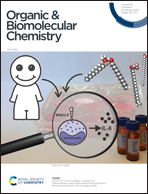Isoquinolinequinone N-oxides as anticancer agents effective against drug resistant cell lines†
Abstract
The isoquinolinequinone (IQQ) pharmacophore is a privileged framework in known cytotoxic natural product families, caulibugulones and mansouramycins. Exploiting both families as a chemical starting point, we report on the structured development of an IQQ N-oxide anticancer framework which exhibits growth inhibition in the nM range across melanoma, ovarian and leukaemia cancer cell lines. A new lead compound (16, R6 = benzyl, R7 = H) exhibits nM GI50 values against 31/57 human tumour cell lines screened as part of the NCI60 panel and shows activity against doxorubicin resistant tumour cell lines. An electrochemical study highlights a correlation between electropositivity of the IQQ N-oxide framework and cytotoxicity. Adduct binding to sulfur based biological nucleophiles glutathione and cysteine was observed in vitro. This new framework possesses significant anticancer potential.

- This article is part of the themed collection: Chemical Biology in OBC


 Please wait while we load your content...
Please wait while we load your content...